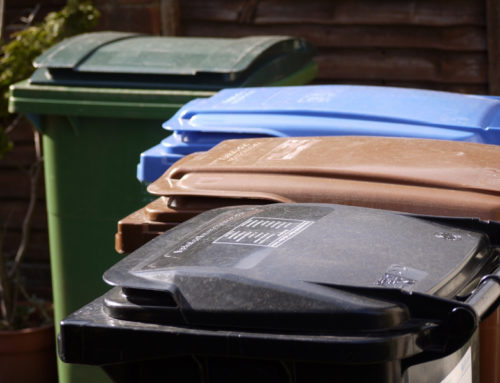by Peter Jones
6 minute read
Last week, the Daily Express ran a story warning of the dire consequences of the planned introduction of monthly residual waste collections in Conwy, North Wales. Reducing collection frequencies would lead to a variety of ills such as swarms of rats and flies, unpleasant odours and a surge in fly-tipping, the paper claimed.
That the Express should react in this way shouldn’t come as a surprise: after all they raised much the same fears when three-weekly were first being implemented, and a decade ago they were making the same predictions about the now commonplace fortnightly collections. The most remarkable thing is that the Daily Mail, seemingly in the grip of a marine plastic inspired Damascene conversion to the cause of recycling, appears to have ignored the story – something that would have been wildly improbable even a year ago.
It’s particularly surprising because the Mail critiqued Conwy’s bin policies back in February 2016, when the then administration (made up of Plaid Cymru, Labour and Independent councillors) decided to implement three weekly collections, but also to run a limited trial of a four weekly system to see how it performed. Regardless of your opinion of the merits of the four-weekly policy, the situation in Conwy since then has had something of a soap opera character to it.
Into administration
Following the 2017 council elections in June, a new coalition formed. It was a complicated process: a Plaid Cymru member (though not the leader of their group) was elected the council leader, and tried to partner with the Conservatives, but Plaid’s national leadership vetoed the initiative. The council leader quit Plaid, and what emerged was a coalition of Conservatives and Independents, propped up by a confidence and supply arrangement with the Liberal Democrats.
The Conservatives’ 2016 Welsh Assembly manifesto had promised legislation “to ensure councils collect residual waste no less frequently than fortnightly, to protect public health and deter fly-tipping.” With the party now in office in Conwy, it seemed that the days of the four weekly collections trial – dramatically dubbed a “health time-bomb” by one of the independent councillors – would be numbered. Even Labour councillors, whose party had helped introduce the trial, were complaining of the iniquity of different services for different streets.
For a cash-strapped council, though, things weren’t quite so simple. In November 2017, the Economy and Place Overview and Scrutiny Committee voted to scrap the four-weekly scheme and move all homes to the three-weekly collections. They were overruled by the Cabinet in December, and it was decided that the status quo would continue for 12 months. But the next month the Cabinet changed course and announced that four-weekly collections would be rolled out across the borough by 2019 – though only one of the five Conservative members voted in favour.

Row of bins: inflammatory media stories do little to help inform the debate. Photo: Alan Stanton (CC BY-SA 2.0), via Flickr.
As if that were not enough drama, the council’s decision has been fiercely opposed by the local (Conservative) Assembly Members, and now a special meeting of the full council has been scheduled for 26th February, at which the Cabinet’s decision could be reversed.
Health warning
It’s into this somewhat febrile context that the Express’s story emerged, at a time when it’s particularly important that councillors and the electorate have accurate information about the important decision that is being taken. In the past I’ve used the press complaints system to contest the newspapers’ evidence-free claims about reduced residual waste collections, getting them to withdraw or amend some stories. However, knowing the way that IPSO, the press regulator, works, it was clear that there was little prospect of a successful complaint.
That isn’t because I’m aware of much evidence to suggest that the fears expressed over fortnightly collections will finally come true if collections are made monthly. I’ve recently analysed the fly-tipping statistics for England, for example, and found no correlation between collection frequency and increases in the reported number of incidents.
Rather, it’s because the article – including much of its outraged language – is entirely based on a press release from the Chartered Institute of Environmental Health (CIEH). It’s they, rather than the Express, that offer the following comments:
“Any missed collections will mean a staggering eight week wait between bin collections”
“There is a significant risk of increased fly-tipping as people struggle to fit four weeks’ worth of waste into one wheelie bin.”
“There is also the risk to our wildlife and environment from uncollected waste, especially in warmer weather, coming from pests and insects.”
With these quotes to build the story around, there was little need for the embroidery of outrage and predictable quotes from the Taxpayers Alliance that have been a feature of similar Express stories in the past.
Another odd fact is that several days before the press release was issued, the CIEH had offered much the same quotes to a venerable and respected journalist covering North Wales. He used them in a local press story published on 4th February by the Daily Post, a paper in with the same owners as the Express. The press release then came out on 7th Feb, when the Express picked it up.
Institutional support
In my experience, professional bodies tend to be quite staid institutions, disinclined to stir up controversy and keen to highlight their technical knowledge. Back in 2007, when the implications of fortnightly collections were being scrutinised by Parliament, CIEH were happy to opine that there is no evidence of health risk, provided food waste is adequately dealt with. You might imagine that, before weighing into a fraught political debate, CIEH would gather a good deal of evidentiary backing – and that would be useful information to get hold of.
As there were no sources mentioned in the press release, I decided to get in touch to find out more about how the CIEH had assessed the risks around fly-tipping, wildlife and pests that they commented on so confidently. The press officer was friendly, but would say nothing more than “we are content with our original statement on this issue as being sound environmental health practice”.
I find this pretty mysterious. What would lead a professional body to insert itself into a debate that’s raging at a national and local level in Wales? Why would it so closely echo the concerns that have been raised by critics of Conwy’s reduced collection frequencies? Why would it assert that there are environmental health risks to four weekly collections, but be unwilling to explain how it arrived at this view?
These are questions that CIEH ought to be willing to answer. They are a seemingly authoritative voice that could influence the debate in Conwy, where the council’s decision may turn on just a few votes. If they’re using their position to make claims that aren’t warranted by evidence, that’s important.
In the meantime, I will eagerly await the outcome of the council meeting on 26th February. Despite CIEH’s intervention, Conwy’s recycling goals and financial constraints may yet see it become the first council in the Wales to follow in Falkirk’s footsteps and go four-weekly.






Update: Conwy’s cabinet has decided unanimously to introduce the 4-weekly collection service from September 2018: https://www.dailypost.co.uk/news/north-wales-news/monthly-bin-collections-countys-homes-14407066
For those looking for evidence on the risks associated with reducing collection frequency, here is a study from Zero Waste Scotland covering exactly that topic:
http://www.zerowastescotland.org.uk/sites/default/files/health%20impacts%20report.pdf
The conclusion is that there are straightforward mitigations for any small risk increases that might arise and that the risk is therefore “little changed from that experienced with existing weekly and fortnightly collections.”